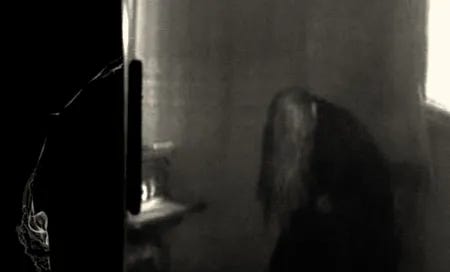Ethel Cain, Perverts ALBUM REVIEW
Punishing and rewarding dark ambient misery for the musically curious
Grade: B
Ethel Cain’s newest project, Perverts, is dark, unsettling, patience-testing, but ultimately rewarding in many ways. Like a dark religious cult, it challenges the listener to love and trust its leader unquestionably. All of her previous albums featured longer, ambient song structures, but each had consistent rhythms, lyrics, and melodies to latch onto. The opening track makes it clear upfront that this will not be the case here. After a brief, old-timey recording of a 19th-century American Christian folk song straight out of Bioshock: Infinite, Ethel kills the noise. Structure becomes a foreign concept as we are introduced to synth drones and ghostly, disembodied voices that make up much of the album’s runtime. Many have compared it to Silent Hill 2, and I would agree. It definitely feels like haplessly trying to find your way through the fog as a looming threat hunts you. However, after really getting lost in the soundscape and the lyrics, the record’s purpose begins to be revealed, and the pervert begins to show parts of itself, so to speak.
If you’re already an Ethel Cain cult member (like myself), you may have already seen this direction coming. Tracks like the demonic “Ptolemaea” or spacey, thematic “Televangelism” on her last record pointed toward possession and dark desolation. Or maybe it was her social media posts about hating music memes and not wanting to be boxed in. Or perhaps it’s because “American Teenager” is the only song of its kind that she has ever made. Radio singles have never been her thing, so I’m not sure why anyone expected more of them. On Perverts, she leans more into the post-rock of Godspeed! You Black Emperor and the slow-burning sludge of Type O Negative than ever before. Tracks like the 14-minute “Housofpsychoticwomen” sound like a score for a film that has yet to be released. Ethel’s distorted voice proclaims “I love you” over and over again, accompanied by low octave shadowy synth pads and cycling terror. It’s a love ritual that would be performed shortly before eating the person it’s cast on.
Thematically, the record shifts from the character of Ethel Cain to delve into some character development. She is a deeply religious person, but she is also trans and bisexual. If you didn’t grow up around a strict Christian upbringing, it might be harder to understand why that could be an issue. In the Christian faith, perversion outside a cis husband-wife dynamic is seen as almost Satanic. Satan, after all, was banished from Heaven for his “treacherous” ways, which include homosexuality, whether monogamous or not. The opening track gives the listener that feeling, presenting a “Godly” folk song before ripping that comfort away and plunging us into near silence. When melody and structure return briefly in the next track, “Punish,” Ethel softly sings, “Shame is sharp…I was an angel, but they made me leave…punished by love,” before being overpowered by sludge metal guitars. It’s a tragic ballad about fruitless devotion to a God that wants nothing to do with you and the denial of love—the most foundational human need. It’s a powerful theme that paints the rest of the album in melancholy.
As the record progresses, Ethel begins to embrace this punished side of herself. By “Vacillator,” she is in a more sexual mode, but in a Nosferatu kind of way. “Close the door…let me in,” she sings as shuffling drums come to a silent halt, and moans begin to slide from headphone to headphone. It’s almost simulating a secret rendezvous, with the iconic line, “If you love me, keep it to yourself.” I initially read this line as cold and closed off to love with this person, but upon further listening, I realized that the only way to engage in this sinful “proclivity” is in the dark corners, where God’s not watching. I love how certain songs act as pillars, giving more obvious hints toward the album’s themes before returning to the droning soundscape. “Onanist” pulls her deep into this distorted world of pleasure, before claiming a new set of Satanic commandments on “Pulldrone.” The narrative almost becomes: If I’m not accepted by the God that banished me to Hell, I’ll claw my way back up to his kingdom and take it over myself. This turn, coupled with the spooky soundplay, explores a whole new side of Ethel that I knew she had, but wasn’t sure when she’d display it.
“Amber Waves” concludes the project by giving us some classic, morbid, rotting Ethel Cain Americana. It slowly unfurls itself, fully displaying its themes of longing and inevitable loss. Her arms are spread open with nothing to give as slow, meditative guitars creep underneath like wind in a grain field. It feels so good to hear her natural voice after so much turmoil and heavily distorted screams from the void. The song fades slowly, almost inviting you back into the pitch-black maze you just emerged from. And if you’re anything like me, you jump right back in for New Game Plus.
This is the first great record of 2025; we’re starting out strong. The only thing keeping me from giving it anything higher than a B for now is that I’ve heard more compelling post-rock and dark ambient music. I like challenging music, but I could’ve used more dynamic musicality or crescendos, especially with a runtime of an hour and a half. If this was paired with a film or visuals, I would probably appreciate it more. It reminds me of Mica Levi’s soundtracks for Under the Skin and Zone of Interest. I also happen to prefer her last project, Preacher’s Daughter, and would give that a B+. I’m really looking forward to how this sound will influence her future albums. For more 2025 music reviews and commentary, watch this space.




